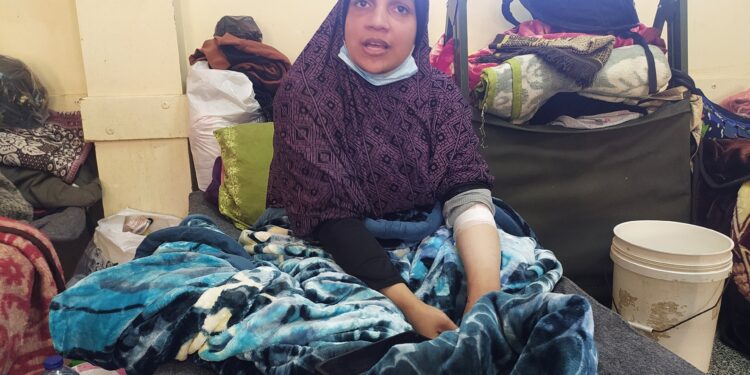Al Jazeera Net correspondents
GazaWalaa Masoud will not fulfill her promise to her only child, Karim, to celebrate his birthday when the Israeli war on the Gaza Strip stops. He was kidnapped by violent air strikes that destroyed an entire residential square in the Jabalia refugee camp in the northern Gaza Strip.
These raids took place on October 31, one day after Karim’s fifth birthday, and his mother told Al Jazeera Net, “He was happy and the atmosphere was not appropriate to fulfill his request to celebrate his birth, and I promised him that I would hold a big party for him after the war.”
Karim is the only son of this thirty-year-old mother. She and her husband, Abdul Aziz Ward, are complaining of a problem that is preventing them from having another child, which Karim had been wishing for, and who kept asking them, “Why don’t I have a brother?”
Karim is a martyr
This couple gave birth to their son, Karim, about a year after their marriage, after which they suffered from childbearing problems. They had a pre-scheduled travel date to undergo medical examinations in Egypt in the hope of having another child. According to Walaa: “We were waiting for a passport to be issued for Karim, to accompany us on the trip that was scheduled on the fifth day of the war.”
Karim dreamed of becoming a doctor, and his parents described him as “smart, prayed regularly and read the Qur’an, and loved to participate in discussions and topics beyond his age.” His father, Abdul Aziz, told Al Jazeera Net, “Karim loves pizza, but he spent his last days on a little water and canned food ( canned food).
Since the launch of its ground operation, Israel has isolated Gaza City and the northern Gaza Strip from its south, and its forces have penetrated deep into densely populated areas. It has prevented all supplies and humanitarian needs from the residents remaining in those areas, after it forced hundreds of thousands to flee south under threats and bombardment.
With teary eyes, and next to her is her husband, Abdul Aziz, reviewing pictures of Karim that he keeps on his mobile phone, Walaa says, “Life is difficult to come back without Karim.”
Block 6 massacre
This small, peaceful family lived in the Al-Saftawi area, north of Gaza City, and was displaced due to the severity of the Israeli air strikes in its vicinity, with relatives in “Block 6” of the Jabalia camp, the most densely populated of the eight refugee camps in the Strip.
A few days after the displacement of Walaa and her husband, Abdulaziz, with their only son, Karim, that area became the scene of a massacre comparable in bloodiness to what the occupation army committed at the “Baptist Hospital,” when warplanes launched intense raids that destroyed an entire residential square, and killed, according to the Ministry of Health’s documentation, about a thousand of its residents. Martyrs and wounded.
Walaa’s entire family (13 members) was martyred when the house collapsed on their heads. At that moment, she was with Abdulaziz and Karim, a few meters away in another house of one of her uncles, which was also completely destroyed. She says about about an hour she spent buried under the rubble, “I was repeating the two testimonies of faith and I thought I was a martyr.” “.
Through his own effort and determination to live, Abdul Aziz was able to remove the rubble and emerge alive from under the rubble. He helped volunteer rescuers and the Civil Defense rescue others, including his wife, Walaa. He did not know anything about Karim. He said, “I looked for him in the departments of the Indonesian hospital, and they were The thunderbolt came when my eyes fell on a small shroud among large numbers of bodies of martyrs in shrouds, and it was written in black: Martyr Karim Abdel Aziz Ward.”
Members of Walaa and her husband’s relatives are still under the rubble of their destroyed homes, and civil defense teams were unable to recover them, while she was forced, along with her husband and the remaining surviving relatives, to flee south, following intense, violent raids on the “Indonesian Hospital” where she was receiving treatment.

Escaping death for the second time
Walaa says, “We spent terrifying days in the Indonesian hospital, where it was targeted by air and artillery strikes. The ceiling of the room fell on my body, and had it not been for God’s care, a shrapnel that penetrated the window would have killed me, while a number of the wounded were martyred in an adjacent room, inside which fragments of rockets and shells were scattered.”
On a rickety bed in Jenin Secondary School, close to the Gaza European Hospital, northeast of the city of Rafah, Walaa lies with her leg wrapped in plaster, due to fractures she sustained as a result of a concrete column falling on her. She complains of poor medical care, and fears that she will not be able to walk on her feet again.
On the way from the Indonesian Hospital in the north to the south of the Gaza Strip, where Walaa found herself in a school due to the lack of vacant places in hospitals, she spent about 6 hours standing on her feet despite her pain and wounds, after the occupation army forced the hospital administration to evacuate hundreds of wounded and sick people in only 4 buses. The capacity of one bus is 50 passengers, and Walaa says, “The bus was like a can of sardines,” as an expression of the severe overcrowding.
Walaa, a prisoner, is experiencing the pain of her wounds and her grief over the loss of her only son, Karim, and her entire family. She says that she is unable to think about what is coming, and she wishes that she had accompanied the martyrs.



